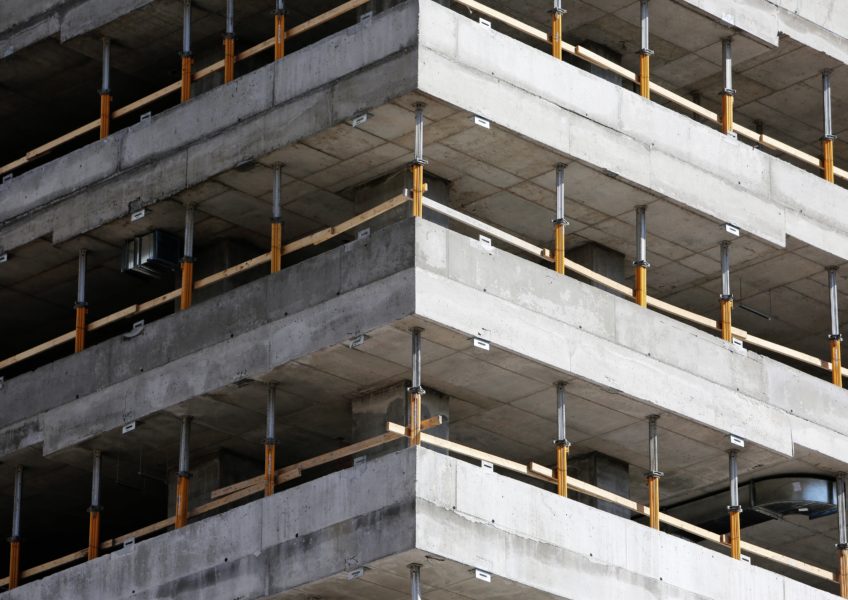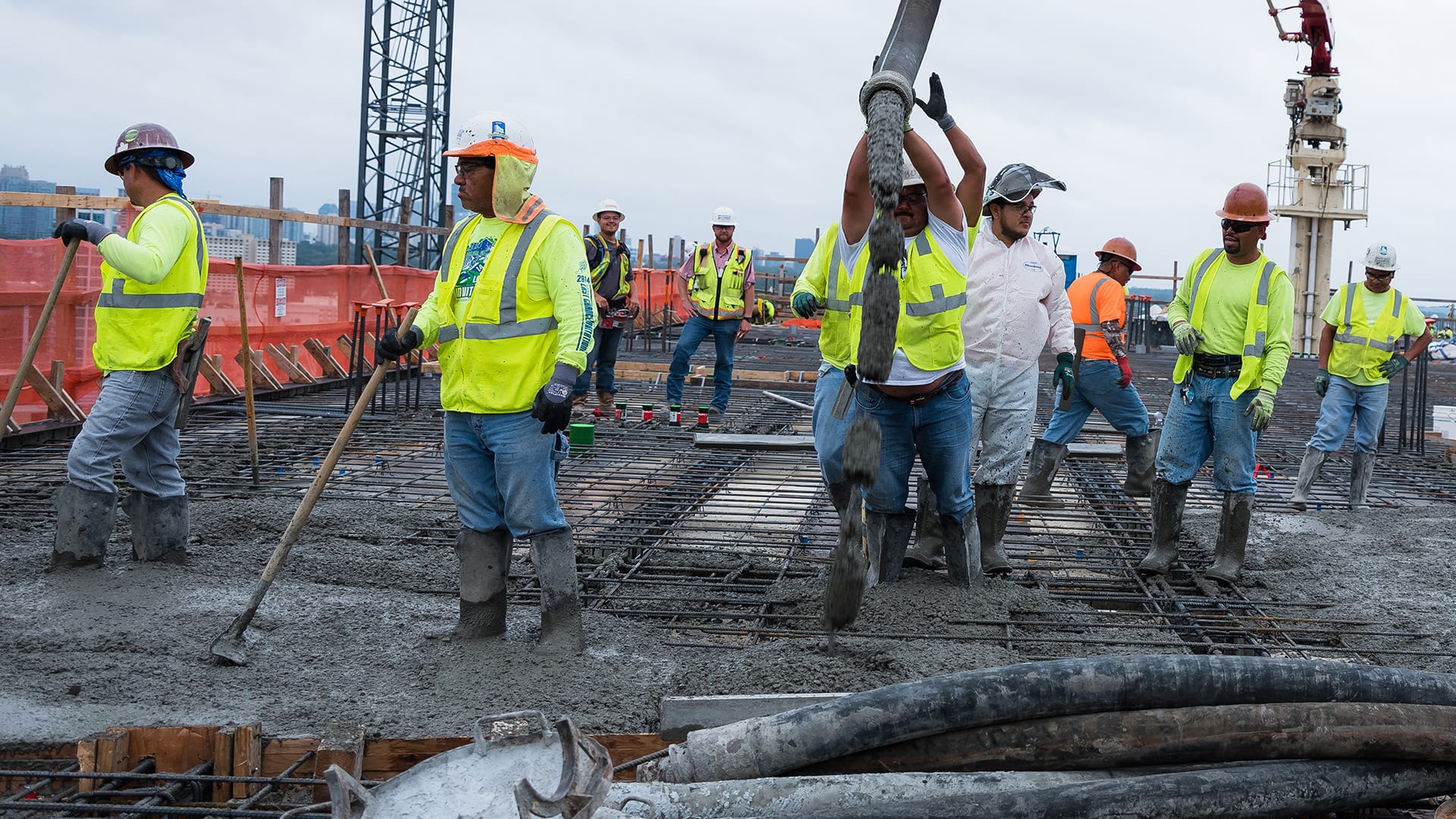Is West Coast General Engineering industrial concrete Right for Your Plant?
Is West Coast General Engineering industrial concrete Right for Your Plant?
Blog Article
The Vital Duty of Concrete Foundation in Structural Integrity and Durability
When it pertains to constructing a home, the structure is extra essential than you could assume. Concrete structures give unparalleled toughness and resilience, ensuring your structure can withstand various ecological challenges. Without a solid base, you risk possible issues like changing or fracturing, which can endanger security and value. Comprehending the nuances of concrete foundations can be the trick to maintaining your financial investment for several years ahead. What should you take into consideration following?
Recognizing the Value of Concrete Foundations
Concrete foundations are important to the general stability of any kind of structure, as they provide the important support needed to hold up against numerous tons and environmental problems. When you believe about constructing a home or a business space, the structure is the initial thing you should take into consideration. It works as an obstacle against dampness, protecting your residential property from water damage. A well-placed concrete structure additionally avoids settling and moving, which can lead to cracks in wall surfaces and floorings. You'll intend to assure that the structure is appropriately designed and enhanced, as this affects the durability of your structure. In addition, a solid foundation can boost power performance by decreasing air leaks. Keep in mind, overlooking the importance of a concrete foundation can cause costly repair work down the line. So, spending in a top quality structure upfront is crucial for the integrity and resilience of your framework.
Advantages of Concrete Structures for Structural Honesty
While many aspects contribute to a building's structural integrity, concrete structures use unmatched sturdiness and stamina. You'll value that concrete can hold up against extreme climate condition, resisting both moisture and temperature fluctuations. This durability indicates your framework is less likely to experience fracturing or moving gradually, which can compromise its safety.Additionally, concrete's intrinsic weight supplies a solid base, stopping movement during natural occasions like earthquakes or floods. When you choose a concrete foundation, you're likewise choosing for reduced upkeep; unlike timber, it won't rot or attract parasites, conserving you money and time in repairs.Moreover, concrete's fire resistance uses included security, guaranteeing your framework can endure high temperature levels without significant damages. On the whole, spending in a concrete foundation suggests you're prioritizing the lasting security and stability of your building, making it a wise selection for any type of building project.
Common Kinds Of Concrete Foundations
When it concerns building structures, comprehending the usual kinds of concrete foundations can assist you make notified options for your job. One of the most prevalent types include slab-on-grade, crawl space, and complete basement foundations.A slab-on-grade foundation is a basic, cost-efficient option, where a thick concrete piece is put straight on the ground. This kind functions well in warm environments, as it reduces heat loss.Crawl room foundations boost the home somewhat above ground, enabling air flow and access to plumbing and electric systems. This design can help protect against dampness issues.Full cellar structures provide extra living or storage area while supplying excellent architectural support. They call for even more excavation and are usually used in colder environments to stop frost heave.
Factors to Take Into Consideration When Creating a Concrete Structure

Best Practices for Installing Concrete Foundations
When you're mounting a concrete structure, appropriate website prep work is necessary to guarantee security (West Coast General Engineering Concrete). You'll additionally require to understand reinforcement methods to improve toughness and longevity. Finally, do not overlook the treating process, as it plays a fundamental role in attaining a solid foundation
Site Prep Work Value
Although it might seem simple, proper website preparation is important for assuring a solid and sturdy concrete foundation. Start by clearing the area of any particles, plants, or organic material that can jeopardize the foundation's integrity. Next, evaluate the dirt kind and compaction; you might require to dig deep into or include products to develop a secure base. Level the ground to assure also weight circulation and avoid resolving problems later. Mounting correct drainage systems is additionally vital to prevent water buildup, which can weaken the structure over time. Mark out the foundation's measurements precisely to direct the putting process. By complying with these actions, you'll set the phase for a successful concrete structure that stands the examination of time.
Support Methods Explained
As soon as the website is correctly prepared, the next step in ensuring a sturdy concrete structure includes applying efficient support strategies. You should begin by utilizing steel rebar, which gives tensile stamina and assists avoid fracturing. Lay the rebar in a grid pattern, making sure it rises making use of spacers to preserve appropriate mass concrete protection. Additionally, think about using cable mesh for added assistance, specifically in areas subject to heavy tons. Don't neglect to connect the rebar junctions firmly with wire. For bigger structures, fiber reinforcement can boost sturdiness, decreasing the threat of shrinking splits. Constantly adhere to local building regulations and guidelines to make certain conformity. By using these reinforcement techniques, you'll considerably enhance your structure's toughness and longevity, laying a solid groundwork for your framework.
Healing Process Basics
To ensure your concrete foundation cures effectively, it is essential to keep ample moisture and temperature level conditions right away after putting. Begin by covering the surface with a damp cloth or plastic sheet to maintain dampness. This maintains the concrete hydrated, protecting against splits and guaranteeing toughness. You should additionally keep an eye on the temperature; optimal curing conditions are in between 50 ° F and 90 ° F. If it's also hot, mist the surface consistently to avoid rapid dissipation. For winter, take into consideration using protecting coverings to preserve warmth. Go for a treating duration of at the very least 7 days, as this is essential for optimum stamina growth. By following these over here ideal practices, you'll improve your foundation's resilience and longevity, ensuring structural honesty for years to come.
Upkeep of Concrete Foundations for Durability
To maintain your concrete structure solid and enduring, normal inspections are necessary. You should also guarantee efficient drain options remain in place to stop water damage. If you identify any kind of splits, addressing them without delay will conserve you from bigger problems down the line.

Regular Inspections and Assessments
While normal evaluations and evaluations might look like a task, visit this page they're important for maintaining the stability of your concrete structure. By routinely looking for splits, changes, or indicators of wear, you can capture prospective concerns prior to they escalate into expensive repair services. Search for any kind of water pooling around the structure or uncommon settling, as these can signify underlying problems. It's additionally smart to check any type of changes in your house's structure, like doors that stick or home windows that do not open efficiently. Maintaining a document of your examinations helps track modifications in time, permitting positive maintenance. Eventually, these assessments assure your structure continues to be secure, sustaining the longevity and security of your whole structure. Do not overlook this important facet of homeownership!
Efficient Drainage Solutions
Regular examinations can expose concerns like drain problems that may jeopardize your concrete structure's security. To avoid water accumulation, assure your seamless gutters and downspouts straight water away from the foundation. Installing French drains can efficiently reroute surface and groundwater, decreasing stress on your structure walls. In addition, grading the soil around your home assists guarantee that water moves away, instead of merging near your foundation.Consider using sump pumps in locations susceptible to flooding, as they proactively eliminate excess water. Consistently examine for clogs in drainage systems and clear them quickly. You'll secure your foundation's stability and longevity by taking these aggressive measures. Bear in mind, effective drain services are important for keeping a solid, durable concrete structure.
Trigger Fracture Services
When you notice splits in your concrete foundation, addressing them promptly is essential for maintaining its longevity. Tiny cracks can quickly advance right into larger problems, compromising the architectural integrity of your home. Regularly inspect your foundation for indications of damages, such as straight or upright cracks. If you detect any kind of, do not wait-- fix them promptly. You can use epoxy injections or concrete patching substances, which work for securing fractures. Always comply with the manufacturer's directions and think about consulting a professional for considerable damage. Remember, prompt fixings not just enhance your foundation's sturdiness however additionally save you money in the future by stopping more considerable repairs down the line. Keep aggressive, and your structure will stay strong and safe and secure.
Dealing With Typical Issues With Concrete Structures
Concrete structures can deal with numerous concerns with time, making it critical to recognize and resolve them quickly. Among one of the most common issues is breaking, which can occur due to temperature level changes or resolving soil. If you discover cracks, it's crucial to evaluate their size and deepness; little cracks can usually be sealed, while larger ones may call for professional evaluation.Water breach is another major problem. Excess dampness can lead to mold and mildew growth and structural damage. Assurance appropriate drain around your structure to minimize this threat. Additionally, seek indicators of shifting or bowing walls, as this can suggest underlying problems with your foundation's stability.Regular inspections are essential to capture these troubles early. If you detect any worrying indications, don't hesitate to speak with a foundation specialist. By staying proactive, you can maintain the integrity and durability of your concrete structure, assuring your home continues to be secure and safe and secure.
Regularly Asked Questions
Just How Does Soil Kind Impact Concrete Foundation Performance?
Dirt type considerably affects concrete structure efficiency. If you have actually got large clay, for instance, it can cause changing and splitting. Sandy dirt may cause working out. Understanding your dirt assists ensure a steady foundation.
Can Concrete Foundations Be Repaired if Harmed?
Yes, you can repair broken concrete foundations. Depending on the degree of the damages, techniques like epoxy injection or piece jacking can bring back stability. It's ideal to get in touch with a professional for efficient services.
What Is the Common Lifespan of a Concrete Foundation?
A concrete foundation commonly lasts 30 to 100 years, relying on aspects like dirt conditions, environment, and maintenance. You'll wish to keep an eye on it to ensure it continues to be in good form throughout its lifespan.
Exist Option Products to Concrete for Foundations?
Yes, there are alternatives to concrete for structures, like steel, timber, or perhaps recycled materials. Each option has unique benefits and drawbacks, so you ought to consider your job's particular demands when choosing the best material.
Just How Does Climate Effect Concrete Foundation Durability?
Environment significantly influences concrete foundation durability (West Coast General Engineering industrial concrete). Severe temperature levels, dampness, and freeze-thaw cycles can damage the material, leading to cracks and architectural issues. You must consider local climate conditions when intending your structure to assure long-term performance
Report this page